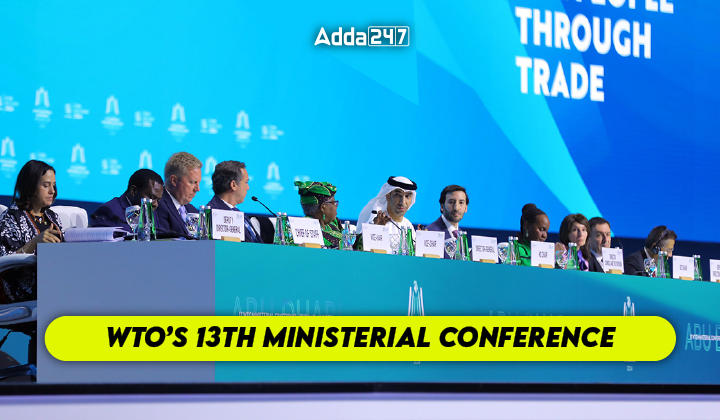Table of Contents
The 13th WTO Ministerial Conference in Abu Dhabi was marked by the contentious non-adoption of the Investment Facilitation for Development (IFD) agreement, despite broad support. India’s opposition, based on the relevance of investment to the WTO’s trade focus and procedural concerns, highlighted the challenges in evolving the WTO’s rulebook. The situation underscores the complexities of international trade negotiations and the struggle to balance multilateral agreements with national interests.
WTO’s 13th Ministerial Conference
- A significant event at the 13th Ministerial Conference of the World Trade Organization (WTO) in Abu Dhabi was the decision not to adopt the Investment Facilitation for Development (IFD) agreement.
- Despite backing from over 70% of WTO member countries, India and other nations opposed the inclusion of the IFD agreement within the WTO’s framework.
Background of the IFD Agreement
- Initiated in 2017 by 70 countries under the Joint Statement Initiative.
- Aimed to legally bind members to enhance investment flows through regulatory transparency and streamlined administrative procedures.
- Excluded market access, investment protection, and investor-state dispute settlement (ISDS) issues.
- Finalized in November 2023, supported by around 120 of the 166 WTO member countries.
India’s Key Concerns
- Applicability to WTO: India challenges the inclusion of investment as a WTO subject, arguing investment doesn’t inherently equate to trade.
- Negotiation Process: India contends there was no agreed mandate for investment negotiations within the WTO framework, citing past decisions that excluded trade and investment talks from the Doha round.
The Debate on Investment and Trade
- Economic theories and the OECD highlight a strong link between trade and investment, evidenced by global value chains.
- Modern trade agreements, including RCEP and CPTPP, often incorporate comprehensive investment clauses.
Legal and Procedural Questions
- Scope of the Negative Mandate: Whether the mandate against investment negotiations covers facilitation aspects, considering previous discussions focused more on market access and protection.
- Plurilateral Negotiations: The legitimacy of initiating IFD discussions on a plurilateral basis, given the WTO’s consensus requirement for adding new agreements.
WTO’s Legislative Challenges
- The WTO faces decision-making gridlocks, highlighting the need for Plurilateral Agreements (PAs) like the IFD to adapt to evolving trade complexities.
- The IFD’s rejection raises questions about the WTO’s capacity to update and create rules responsive to global economic changes.
Objectives of the WTO
- Facilitating Trade through Reduced Barriers: The WTO is dedicated to lowering trade barriers globally via negotiations, adhering to the principle of non-discrimination. This leads to lower production costs due to more affordable import materials, decreased prices for finished products and services, increased variety, and ultimately, a reduction in living costs.
- Negotiation and Dispute Resolution: The WTO employs a dual approach to uphold its system: through dialogue, where member countries negotiate mutually agreeable rules, and through dispute resolution, ensuring adherence to these established rules.
- Economic Growth and Job Creation: By stimulating international trade, the WTO aims to foster economic expansion and employment opportunities.
- Reducing International Business Costs: The organization strives to make international trade more cost-effective, thus facilitating global business operations.
- Promoting Good Governance: Through its emphasis on transparency and the sharing of information, the WTO aims to create a level playing field, minimizing arbitrariness and the potential for corruption by adhering to set rules.
- Supporting Development: At the core of the WTO’s trade system is the recognition that open trade can accelerate economic growth and aid in the development of countries. The agreements within the WTO are designed with provisions that consider the interests of developing nations.
- Empowering Smaller Nations: The WTO provides a platform where smaller countries can have a more significant voice, mitigating disparities in bargaining power through agreed-upon rules, consensus-driven decision-making, and coalition-building.
- Environmental and Health Advancement: While trade is a means to various ends, the WTO agreements aim to ensure that trade supports broader goals such as environmental protection and health, without serving as a pretext for protectionist measures.
- Contributing to Global Peace and Stability: In times of global economic uncertainty, the WTO’s multilateral trading system offers a stabilizing force, deterring protectionism, enhancing policy predictability, and building confidence by ensuring that all countries, regardless of power, adhere to the agreed-upon rules.
Conclusion
- The non-adoption of the IFD agreement at MC13 reflects underlying tensions within the WTO regarding the scope of its mandate and decision-making processes.
- As a significant global economic player, India’s stance on PAs and its approach to international trade negotiations warrant reconsideration in light of the changing dynamics of global commerce.



 TSPSC Group 1 Question Paper 2024, Downl...
TSPSC Group 1 Question Paper 2024, Downl...
 TSPSC Group 1 Answer key 2024 Out, Downl...
TSPSC Group 1 Answer key 2024 Out, Downl...
 UPSC Prelims 2024 Question Paper, Downlo...
UPSC Prelims 2024 Question Paper, Downlo...
